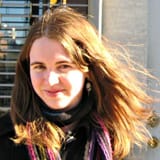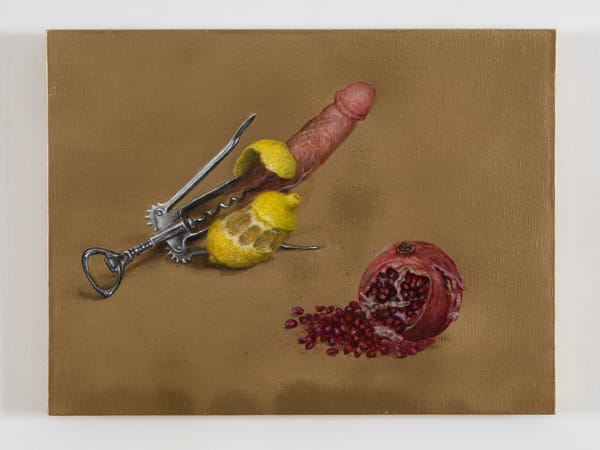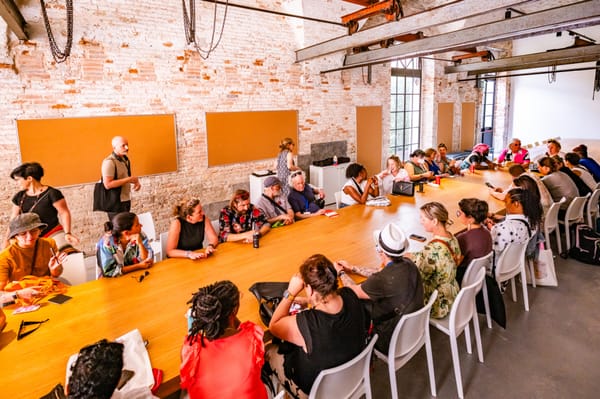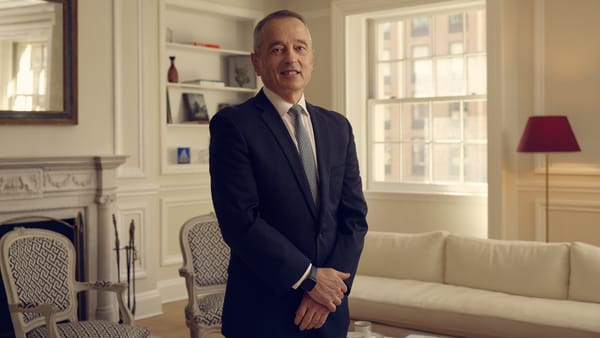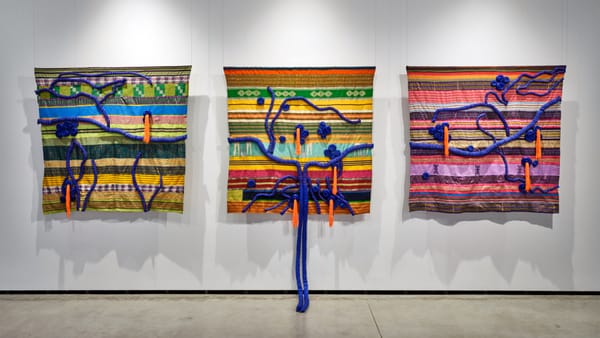Deep Blue vs. Kasparov: Machine's Triumph Over Man
The 1997 six-game match between Garry Kasparov — arguably the top chess player of all time — and IBM's Deep Blue computer was an epochal moment, our blockbuster modernization of John Henry against the train. But it's not obvious fodder for theater.
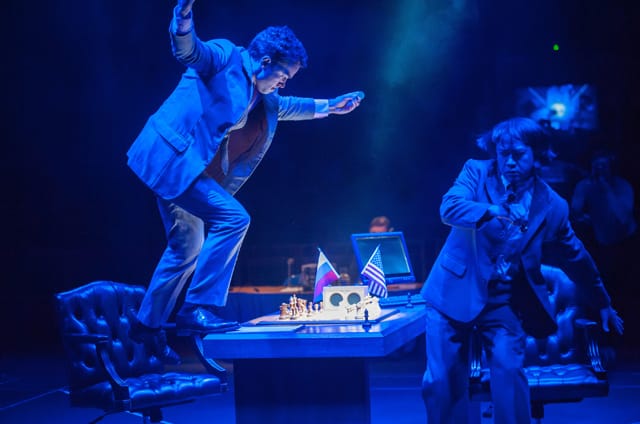
The 1997 six-game match between Garry Kasparov — arguably the top chess player of all time — and IBM’s Deep Blue computer was an epochal moment, our blockbuster modernization of John Henry against the train. But it’s not obvious fodder for theater. Yet The Machine, now showing at the Park Avenue Armory in Manhattan, is using this battle of man versus machine, or rather, man versus the men behind the machine, as its launch for an arena spectacle that spotlights a human drama of self-inflicted defeat.
The Machine opened at the Manchester International Festival earlier this year, and while in England it played in an old Victorian market hall, there are few places as intimidating to fill as the 85-foot-tall Drill Hall of the Park Avenue Armory. For this US premiere, the play by Matt Charman also slimmed down into just over an hour and a half without intermission.
“You do feel dwarfed by the space, and I suppose if there is a sort of latent message within the show it’s that this event that we’re depicting is really a turning point when things changed and humans did seem smaller than something they invented, I think it’s a nice parallel,” Hadley Fraser, who plays Kasparov in The Machine, told Hyperallergic.
Although it hasn’t been too long since the 1997 match, which — spoiler alert — Kasparov lost, there’s been a switch from a mode of thinking that machines couldn’t possibly match the human brain in something like chess, which mixes logic and creativity, to the possibility that they inevitably will.
“I’m 33, and I’m probably the last generation that grew up without having a mobile phone in my childhood,” Fraser said. “I got one when I was 18, and now on mine I have a chess app that could probably beat a lot of grand masters.”
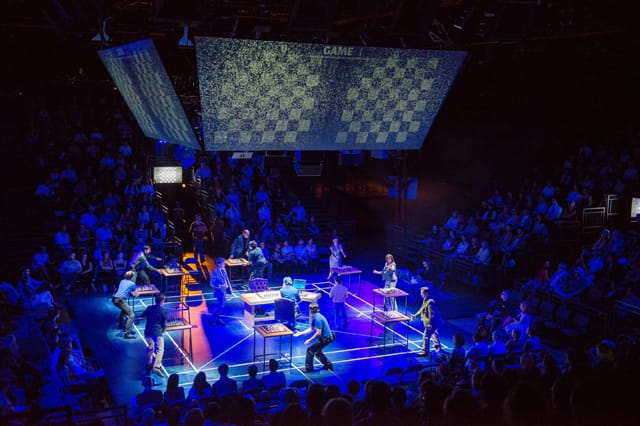
The boxing arena-like setting for The Machine is draped in machines, from the giant screens that loom over the cast to the illuminated computer chip-shaped stage that they walk over, along with the live cameras zooming in on the action of the games and the flashbacks that crackle up in Eastern Block fuzziness or retro computer code on the screens. But it’s the human drama that forms the basis for the play staged by Donmar Warehouse artistic director Josie Rourke: Deep Blue programmer Feng-Hsiung Hsu (played by Kenneth Lee) and Kasparov’s intense obsession with being the best swell into something that in the end is dwarfed by the giant corporate machine of IBM (whose stock price shot up thanks to Deep Blue), capitalism, and the hollow victories of human ability as technology careens onward.
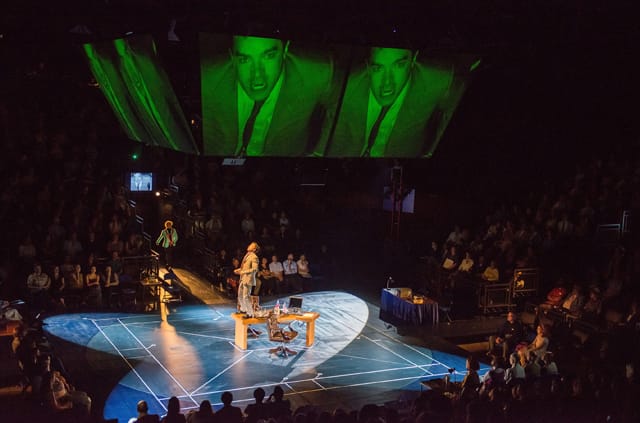
Fraser himself, who is perhaps better known for his musical theater roles of a differently massive vein, like Les Misérables in London, has a focused, compelling take on the shaken chess master. He explained that he got involved while doing another show in London and was drawn to Kasparov as a character that he felt driven to take on. “Plus I loved Matt’s ability to weave a compelling story together out of something ostensibly obscure and staid,” he said. “So I made it back to London for a couple of auditions — arriving for one on the back of a taxi-motorbike because I was so desperate to be involved. I guess Josie and Matt liked what I did in the room (having never worked with either before) and next thing I know I’m commuting from the South Coast (where I was performing at night) back to London for rehearsals for The Machine in the day. It was crazy, but sometimes a project comes along that you feel you have to pull out all the stops for.”
The 1997 match itself took place in New York, with Kasparov’s face hanging in Times Square and appearing on the cover of Newsweek, and now the posters for The Machine have similarly been peppered through the subways and streets. The Machine is the beginning of a series of co-productions from the Manchester International Festival that will be arriving at the Armory along with Massive Attack vs. Adam Curtis later this month and Kenneth Branagh’s Macbeth next June, part of Alex Poots’ duel artistic directing between the two.
“It sort of feels like the show itself is coming to its spiritual home because the event itself happened in New York,” Fraser said. “It was this incredible moment for chess when it thrust itself into the cultural consciousness.”
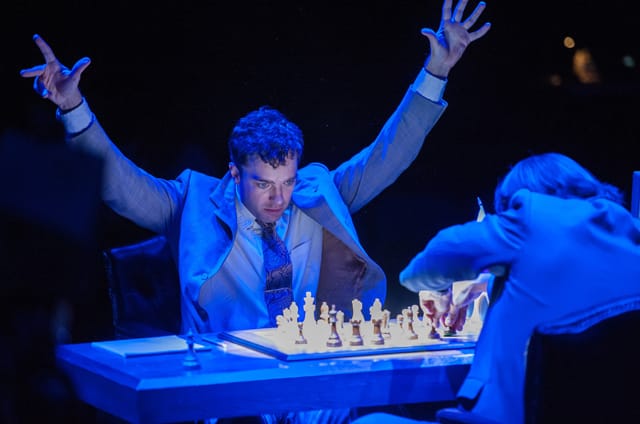
But more than just chess, it was about how we perceived the machines, which are in the end as good as their makers, or perhaps even better. Kasparov famously has maintained that there was some sort of human intervention in the games that resulted in his loss to Deep Blue. And while he’s still very much a presence, especially politically, currently pushing for a boycott against Putin, he retired from professional chess in 2005, perhaps as a result of this doubt over what exactly happened in this high profile pitting of the human brain against what it is capable of building.
“Hopefully we do a good job of planting a seed in the audience’s mind and letting them make up their own mind,” Fraser said. “I think I’ll keep a democratic silence for what I believe.”
The Machine is at the Park Avenue Armory (643 Park Avenue, Upper East Side, Manhattan) through September 18.

